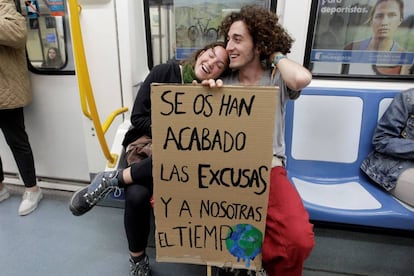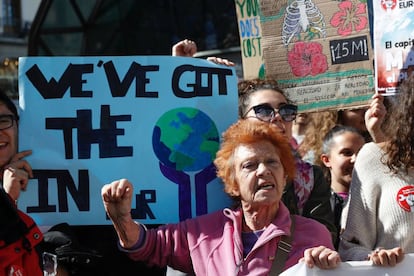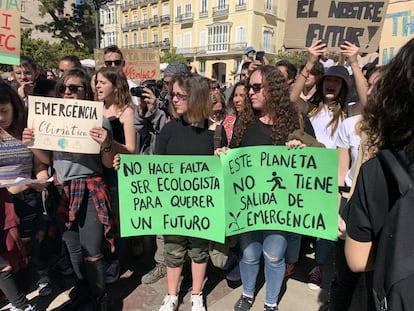Spanish youths start getting organized against climate change
As worldwide protests get underway on March 15, youngsters in Spain are using social media to create groups aimed at pressuring politicians and civil society leaders

Six months after 16-year-old Greta Thunberg stood in downtown Stockholm to protest governments’ lack of action on climate change, the global youth movement that it spawned is holding a day of worldwide protests.
At noon on Friday, youths began protesting in more than a thousand towns and cities across the globe, including around 30 municipalities in Spain, where the local branch of the Fridays for Future movement said the protest will be “a milestone in the history of environmentalism.”
Your only concern in order to join this movement needs to be whether you love your planet
Iciar, 17-year-old student
Juventud por el Clima (JxC) (Youth for the Climate) and Fridays for Future Spain (FFF) are two Spanish movements to have recently sprung from Thunberg’s original call to action. There are hundreds of members, organized through dozens of WhatsApp groups and meeting in assemblies where they decide on the next steps to take. There are honor students, athletes, youngsters with dreadlocks and artists; some of them are in high school and others in college, and their ages range from 14 to 25, but they all share a common goal: pressuring those who are “stealing the future” so things will change “while there is still time.”
Their criticism targets politicians, including Spanish Prime Minister Pedro Sánchez of the Socialist Party (PSOE), but it uses a broad rhetoric in an effort to attract as many people as possible to the cause. “Your only concern in order to join this movement needs to be whether you love your planet,” explains Iciar, a 17-year-old from Madrid whose own environmental awakening came two years ago, when a teacher told her about eco-feminism. Now she is part of JxC, an apolitical movement created through social media one month ago.

Iciar is a Girl Scout, she plays volleyball, takes singing lessons, and has spent the last two months working on a school paper about biodegradable polymers. A week ago she told her parents that she had joined the JxC movement, and they took the announcement in their stride.
“She has earned our trust, in that she knows when she should or shouldn’t do something,” says her father Juan Carlos, who is not sure that he would be doing the same thing at her age.
“This is a young people’s concern, because we’re the ones who are going to be left with the problem,” says Iciar. “But it’s only an excuse for real change to start. I honestly believe that this March 15 can contribute something to the future.”

José, a 22-year-old university student, decided to join after experiencing a 50°C summer in Seville. He joined FFF Madrid when there were just 10 people in the WhatsApp group, and now there are more than 250. “This Friday is the starting point for strikes in front of Congress every Friday,” he says, claiming that the first step toward change means that politicians must acknowledge everything they have failed to do so far.
While these are student movements, José feels that all society should shoulder its share of responsibility. “I would tell adults that, while they claim to love their children very much, they are not doing much to build a livable future for them. Governments should listen to the scientists and declare a state of climate emergency.”
English version by Susana Urra.
Tu suscripción se está usando en otro dispositivo
¿Quieres añadir otro usuario a tu suscripción?
Si continúas leyendo en este dispositivo, no se podrá leer en el otro.
FlechaTu suscripción se está usando en otro dispositivo y solo puedes acceder a EL PAÍS desde un dispositivo a la vez.
Si quieres compartir tu cuenta, cambia tu suscripción a la modalidad Premium, así podrás añadir otro usuario. Cada uno accederá con su propia cuenta de email, lo que os permitirá personalizar vuestra experiencia en EL PAÍS.
¿Tienes una suscripción de empresa? Accede aquí para contratar más cuentas.
En el caso de no saber quién está usando tu cuenta, te recomendamos cambiar tu contraseña aquí.
Si decides continuar compartiendo tu cuenta, este mensaje se mostrará en tu dispositivo y en el de la otra persona que está usando tu cuenta de forma indefinida, afectando a tu experiencia de lectura. Puedes consultar aquí los términos y condiciones de la suscripción digital.








































